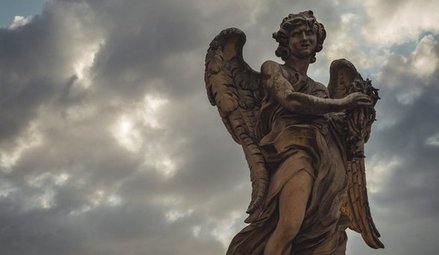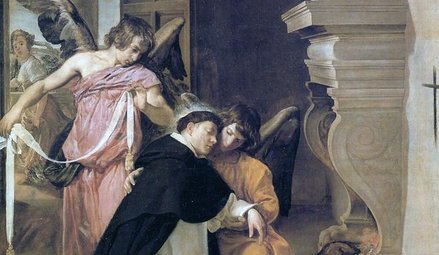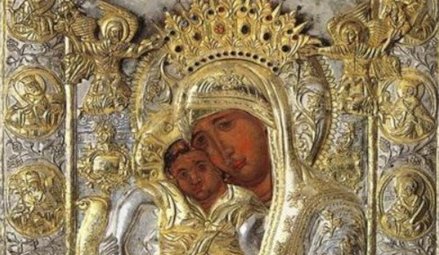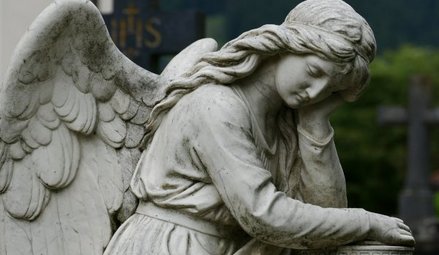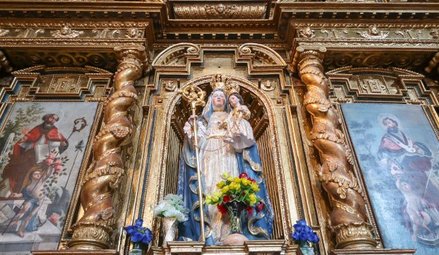- By theme
- Jesus
- The many proofs of Christ’s resurrection
- Saint Thomas Aquinas: God gave all the divine proofs we needed to believe
- The surpassing power of Christ's word
- Lewis’s trilemma: a proof of Jesus’s divinity
- God saves: the power of the holy name of Jesus
- Jesus spoke and acted as God's equal
- Jesus' divinity is actually implied in the Koran
- Jesus came at the perfect time of history
- Rabbinical sources testify to Jesus' miracles
- Mary
- The Church
- The Bible
- The authors of the Gospels were either eyewitnesses or close contacts of those eyewitnesses
- Onomastics support the historical reliability of the Gospels
- The New Testament was not altered
- The New Testament is the best-attested manuscript of Antiquity
- The Gospels were written too early after the facts to be legends
- Archaeological finds confirm the reliability of the New Testament
- The criterion of embarrassment proves that the Gospels tell the truth
- The dissimilarity criterion strengthens the case for the historical reliability of the Gospels
- 84 details in Acts verified by historical and archaeological sources
- The unique prophecies that announced the Messiah
- The time of the coming of the Messiah was accurately prophesied
- The prophet Isaiah's ultra accurate description of the Messiah's sufferings
- Daniel's "Son of Man" is a portrait of Christ
- The Apostles
- The martyrs
- The protomartyr Saint Stephen (d. 31)
- Polycarp, bishop of Smyrna, disciple of John and martyr (d. 155)
- Saint Blandina and the Martyrs of Lyon: the fortitude of faith (177 AD)
- Saint Agatha stops a volcano from destroying the city of Catania (d. 251)
- Saint Lucy of Syracuse, virgin and martyr for Christ (d. 304)
- Thomas More: “The king’s good servant, but God’s first”
- The martyrdom of Paul Miki and his companions (d. 1597)
- The martyrs of Angers and Avrillé (1794)
- The Martyrs of Compiègne (1794)
- The Vietnamese martyrs Father Andrew Dung-Lac and his 116 companions (17th-19th centuries)
- He braved torture to atone for his apostasy (d. 1818)
- Blaise Marmoiton: the epic journey of a missionary to New Caledonia (d. 1847)
- José Luis Sanchez del Rio, martyred at age 14 for Christ the King (d. 1928)
- Saint Maximilian Kolbe, Knight of the Immaculate (d. 1941)
- The monks
- The Desert Fathers (3rd century)
- Saint Anthony of the Desert, a father of monasticism (d. 356)
- Saint Benedict, father of Western monasticism (d. 550)
- Saint Bruno the Carthusian (d.1101): the miracle of a hidden life
- Blessed Angelo Agostini Mazzinghi: the Carmelite with flowers pouring from his mouth (d. 1438)
- Monk Abel of Valaam's accurate prophecies about Russia (d. 1841)
- The more than 33,000 miracles of Saint Charbel Maklouf (d. 1898)
- Saint Pio of Pietrelcina (d. 1968): How God worked wonders through "a poor brother who prays"
- The surprising death of Father Emmanuel de Floris (d. 1992)
- The prophecies of Saint Paisios of Mount Athos (d. 1994)
- The saints
- Saints Anne and Joachim, parents of the Virgin Mary (19 BC)
- Saint Nazarius, apostle and martyr (d. 68 or 70)
- Ignatius of Antioch: successor of the apostles and witness to the Gospel (d. 117)
- Saint Gregory the Miracle-Worker (d. 270)
- Saint Martin of Tours: patron saint of France, father of monasticism in Gaul, and the first great leader of Western monasticism (d. 397)
- Saint Lupus, the bishop who saved his city from the Huns (d. 623)
- Saint Dominic of Guzman (d.1221): an athlete of the faith
- Saint Francis, the poor man of Assisi (d. 1226)
- Saint Anthony of Padua: "everyone’s saint"
- Saint Rose of Viterbo or How prayer can transform the world (d. 1252)
- Saint Simon Stock receives the scapular of Mount Carmel from the hands of the Virgin Mary
- The unusual boat of Saint Basil of Ryazan
- Saint Agnes of Montepulciano's complete God-confidence (d. 1317)
- The extraordinary conversion of Michelina of Pesaro
- Saint Peter Thomas (d. 1366): a steadfast trust in the Virgin Mary
- Saint Rita of Cascia: hoping against all hope
- Saint Catherine of Genoa and the Fire of God's love (d. 1510)
- Saint Anthony Mary Zaccaria, physician of bodies and souls (d. 1539)
- Saint Ignatius of Loyola (d. 1556): "For the greater glory of God"
- Brother Alphonsus Rodríguez, SJ: the "holy porter" (d. 1617)
- Martin de Porres returns to speed up his beatification (d. 1639)
- Virginia Centurione Bracelli: When God is the only goal, all difficulties are overcome (d.1651)
- Saint Marie of the Incarnation, "the Teresa of New France" (d.1672)
- Rosa Venerini: moving in the ocean of the Will of God (d. 1728)
- Seraphim of Sarov (1759-1833): the purpose of the Christian life is to acquire the Holy Spirit
- Bernadette Soubirous, the shepherdess who saw the Virgin Mary (1858)
- Saint John Vianney (d. 1859): the global fame of a humble village priest
- Gabriel of Our Lady of Sorrows, the "Gardener of the Blessed Virgin" (d. 1862)
- Father Gerin, the holy priest of Grenoble (1863)
- Blessed Francisco Palau y Quer: a lover of the Church (d. 1872)
- Saints Louis and Zelie Martin, the parents of Saint Therese of Lisieux (d. 1894 and 1877)
- The supernatural maturity of Francisco Marto, “contemplative consoler of God” (d. 1919)
- Saint Faustina, apostle of the Divine Mercy (d. 1938)
- Brother Marcel Van (d.19659): a "star has risen in the East"
- Doctors
- The mystics
- Lutgardis of Tongeren and the devotion to the Sacred Heart
- Saint Angela of Foligno (d. 1309) and "Lady Poverty"
- Saint John of the Cross: mystic, reformer, poet, and universal psychologist (+1591)
- Blessed Anne of Jesus: a Carmelite nun with mystical gifts (d.1621)
- Catherine Daniélou: a mystical bride of Christ in Brittany
- Saint Margaret Mary sees the "Heart that so loved mankind"
- Mother Yvonne-Aimée of Jesus' predictions concerning the Second World War (1922)
- Sister Josefa Menendez, apostle of divine mercy (d. 1923)
- Edith Royer (d. 1924) and the Sacred Heart Basilica of Montmartre
- Rozalia Celak, a mystic with a very special mission (d. 1944)
- Visionaries
- Saint Perpetua delivers her brother from Purgatory (203)
- María de Jesús de Ágreda, abbess and friend of the King of Spain
- Discovery of the Virgin Mary's house in Ephesus (1891)
- Sister Benigna Consolata: the "Little Secretary of Merciful Love" (d. 1916)
- Maria Valtorta's visions match data from the Israel Meteorological Service (1943)
- Berthe Petit's prophecies about the two world wars (d. 1943)
- Maria Valtorta saw only one pyramid at Giza in her visions... and she was right! (1944)
- The 700 extraordinary visions of the Gospel received by Maria Valtorta (d. 1961)
- The amazing geological accuracy of Maria Valtorta's writings (d. 1961)
- Maria Valtorta's astronomic observations consistent with her dating system
- Discovery of an ancient princely house in Jerusalem, previously revealed to a mystic (d. 1961)
- The popes
- The great witnesses of the faith
- Saint Augustine's conversion: "Why not this very hour make an end to my uncleanness?" (386)
- Thomas Cajetan (d. 1534): a life in service of the truth
- Madame Acarie, "the servant of the servants of God" (d. 1618)
- Blaise Pascal (d.1662): Biblical prophecies are evidence
- Jacinta, 10, offers her suffering to save souls from hell (d. 1920)
- Father Jean-Édouard Lamy: "another Curé of Ars" (d. 1931)
- Christian civilisation
- The depth of Christian spirituality
- John of the Cross' Path to perfect union with God based on his own experience
- The dogma of the Trinity: an increasingly better understood truth
- The incoherent arguments against Christianity
- The "New Pentecost": modern day, spectacular outpouring of the Holy Spirit
- The Christian faith explains the diversity of religions
- Cardinal Pierre de Bérulle (d.1629) on the mystery of the Incarnation
- Christ's interventions in history
- Marian apparitions and interventions
- The Life-giving Font of Constantinople
- Our Lady of Virtues saves the city of Rennes in Bretagne (1357)
- Mary stops the plague epidemic at Mount Berico (1426)
- Cotignac: the first apparitions of the Modern Era (1519)
- Savona: supernatural origin of the devotion to Our Lady of Mercy (1536)
- The Virgin Mary delivers besieged Christians in Cusco, Peru
- The victory of Lepanto and the feast of Our Lady of the Rosary (1571)
- The apparitions to Brother Fiacre (1637)
- The “aldermen's vow”, or the Marian devotion of the people of Lyon (1643)
- Our Lady of Nazareth in Plancoët, Brittany (1644)
- Our Lady of Laghet (1652)
- Saint Joseph’s apparitions in Cotignac, France (1660)
- Heaven confides in a shepherdess of Le Laus (1664-1718)
- Zeitoun, a two-year miracle (1968-1970)
- The Holy Name of Mary and the major victory of Vienna (1683)
- Heaven and earth meet in Colombia: the Las Lajas shrine (1754)
- A series of Marian apparitions and prophetic messages in Ukraine since the 19th century (1806)
- "Consecrate your parish to the Immaculate Heart of Mary" (1836)
- At La Salette, Mary wept in front of the shepherds (1846)
- Our Lady of Champion, Wisconsin: the first and only approved apparition of Mary in the US (1859)
- Gietrzwald apparitions: heavenly help to a persecuted minority
- The silent apparition of Knock Mhuire in Ireland (1879)
- Mary "Abandoned Mother" appears in a working-class district of Lyon, France (1882)
- The thirty-three apparitions of the Virgin Mary in Beauraing (1932)
- "Our Lady of the Poor" appears eight times in Banneux (1933)
- Fontanelle-Montichiari apparitions of Our Lady "Rosa Mystica" (1947)
- Mary responds to the Vows of the Polish Nation (1956)
- Zeitoun apparitions
- The Virgin Mary comes to France's rescue by appearing at L'Ile Bouchard (1947)
- Maria Esperanza Bianchini and Mary, Mary, Reconciler of Peoples and Nations (1976)
- Luz Amparo and the El Escorial apparitions
- The extraordinary apparitions of Medjugorje and their worldwide impact
- The Virgin Mary prophesied the 1994 Rwandan genocide (1981)
- Our Lady of Soufanieh's apparition and messages to Myrna Nazzour (1982)
- The Virgin Mary heals a teenager, then appears to him dozens of times (1986)
- Seuca, Romania: apparitions and pleas of the Virgin Mary, "Queen of Light" (1995)
- Angels and their manifestations
- Mont Saint-Michel: Heaven watching over France
- Angels give a supernatural belt to the chaste Thomas Aquinas (1243)
- The constant presence of demons and angels in the life of St Frances of Rome (d. 1440)
- Mother Yvonne-Aimée escapes from prison with the help of an angel (1943)
- Saved by Angels: The Miracle on Highway 6 (2008)
- Exorcisms in the name of Christ
- A wave of charity unique in the world
- Saint Peter Nolasco: a life dedicated to ransoming enslaved Christians (d. 1245)
- Saint Angela Merici: Christ came to serve, not to be served (d. 1540)
- Saint John of God: a life dedicated to the care of the poor, sick and those with mental disorders (d. 1550)
- Saint Camillus de Lellis, reformer of hospital care (c. 1560)
- Blessed Alix Le Clerc, encouraged by the Virgin Mary to found schools (d. 1622)
- Saint Vincent de Paul (d. 1660), apostle of charity
- Marguerite Bourgeoys, Montreal's first teacher (d. 1700)
- Frédéric Ozanam, inventor of the Church's social doctrine (d. 1853)
- Damian of Molokai: a leper for Christ (d. 1889)
- Pier Giorgio Frassati (d.1925): heroic charity
- Saint Dulce of the Poor, the Good Angel of Bahia (d. 1992)
- Mother Teresa of Calcutta (d. 1997): an unshakeable faith
- Heidi Baker: Bringing God's love to the poor and forgotten of the world
- Amazing miracles
- The miracle of liquefaction of the blood of St. Januarius (d. 431)
- The miracles of Saint Anthony of Padua (d. 1231)
- Saint Pius V and the miracle of the Crucifix (1565)
- Saint Philip Neri calls a teenager back to life (1583)
- The resurrection of Jérôme Genin (1623)
- Saint Francis de Sales brings back to life a victim of drowning (1623)
- Saint John Bosco and the promise kept beyond the grave (1839)
- The day the sun danced at Fatima (1917)
- Pius XII and the miracle of the sun at the Vatican (1950)
- When Blessed Charles de Foucauld saved a young carpenter named Charle (2016)
- Reinhard Bonnke: 89 million conversions (d. 2019)
- Miraculous cures
- The royal touch: the divine thaumaturgic gift granted to French and English monarchs (11th-19th centuries)
- With 7,500 cases of unexplained cures, Lourdes is unique in the world (1858-today)
- Our Lady at Pellevoisin: "I am all merciful" (1876)
- Mariam, the "little thing of Jesus": a saint from East to West (d.1878)
- Gemma Galgani: healed to atone for sinners' faults (d. 1903)
- The miraculous cure of Blessed Maria Giuseppina Catanea
- The extraordinary healing of Alice Benlian in the Church of the Holy Cross in Damascus (1983)
- The approved miracle for the canonization of Juan Diego Cuauhtlatoatzin (1990)
- Healed by St Charbel Makhlouf, her scars bleed each month for the benefit of unbelievers (1993)
- The miracle that led to Brother André's canonisation (1999)
- Bruce Van Natta's intestinal regrowth: an irrefutable miracle (2007)
- Manouchak, operated on by Saint Charbel (2016)
- How Maya was cured from cancer at Saint Charbel's tomb (2018)
- Preserved bodies of the saints
- Dying in the odour of sanctity
- The body of Saint Cecilia found incorrupt (d. 230)
- Stanislaus Kostka's burning love for God (d. 1568)
- Blessed Antonio Franco, bishop and defender of the poor (d. 1626)
- The incorrupt body of Marie-Louise Nerbollier, the visionary from Diémoz (d. 1910)
- The great exhumation of Saint Charbel (1950)
- Bilocations
- Inedias
- Levitations
- Lacrimations and miraculous images
- Saint Juan Diego's tilma (1531)
- The Rue du Bac apparitions of the Virgin Mary to St. Catherine Labouré (Paris, 1830)
- Mary weeps in Syracuse (1953)
- Teresa Musco (d.1976): salvation through the Cross
- Soufanieh: A flow of oil from an image of the Virgin Mary, and oozing of oil from the face and hands of Myrna Nazzour (1982)
- The Saidnaya icon exudes a wonderful fragrance (1988)
- Our Lady weeps in a bishop's hands (1995)
- Stigmates
- The venerable Lukarda of Oberweimar shares her spiritual riches with her convent (d. 1309)
- Blessed Maria Grazia Tarallo, mystic and stigmatist (d. 1912)
- Saint Padre Pio: crucified by Love (1918)
- Elena Aiello: "a Eucharistic soul"
- A Holy Triduum with a Syrian mystic, witnessing the sufferings of Christ (1987)
- A Holy Thursday in Soufanieh (2004)
- Eucharistic miracles
- Lanciano: the first and possibly the greatest Eucharistic miracle (750)
- A host came to her: 11-year-old Imelda received Communion and died in ecstasy (1333)
- Faverney's hosts miraculously saved from fire
- A tsunami recedes before the Blessed Sacrament (1906)
- Buenos Aires miraculous host sent to forensic lab, found to be heart muscle (1996)
- Relics
- The Veil of Veronica, known as the Manoppello Image
- For centuries, the Shroud of Turin was the only negative image in the world
- The Holy Tunic of Argenteuil's fascinating history
- Saint Louis (d. 1270) and the relics of the Passion
- The miraculous rescue of the Shroud of Turin (1997)
- A comparative study of the blood present in Christ's relics
- Jews discover the Messiah
- Francis Xavier Samson Libermann, Jewish convert to Catholicism (1824)
- Our Lady of the Miraculous Medal and the conversion of Alphonse Ratisbonne (1842)
- Max Jacob: a liberal gay Jewish artist converts to Catholicism (1909)
- Edith Stein - Saint Benedicta of the Cross: "A daughter of Israel who, during the Nazi persecutions, remained united with faith and love to the Crucified Lord, Jesus Christ, as a Catholic, and to her people as a Jew"
- Patrick Elcabache: a Jew discovers the Messiah after his mother is miraculously cured in the name of Jesus
- Cardinal Aron Jean-Marie Lustiger (d. 2007): Chosen by God
- Muslim conversions
- Buddhist conversions
- Atheist conversions
- The conversion of an executioner during the Terror (1830)
- God woos a poet's heart: the story of Paul Claudel's conversion (1886)
- Dazzled by God: Madeleine Delbrêl's story (1924)
- C.S. Lewis, the reluctant convert (1931)
- The day André Frossard met Christ in Paris (1935)
- MC Solaar's rapper converts after experiencing Jesus' pains on the cross
- Father Sébastien Brière, converted at Medjugorje (2003)
- Franca Sozzani, the "Pope of fashion" who wanted to meet the Pope (2016)
- Nelly Gillant: from Reiki Master to Disciple of Christ (2018)
- Testimonies of encounters with Christ
- Near-death experiences (NDEs) confirm Catholic doctrine on the Four Last Things
- The NDE of Saint Christina the Astonishing, a source of conversion to Christ (1170)
- Jesus audibly calls Alphonsus Liguori to follow him (1723)
- Blessed Dina Bélanger (d. 1929): loving God and letting Jesus and Mary do their job
- Gabrielle Bossis: He and I
- André Levet's conversion in prison
- Journey between heaven and hell: a "near-death experience" (1971)
- Alicja Lenczewska: conversations with Jesus (1985)
- Vassula Ryden and the "True Life in God" (1985)
- Nahed Mahmoud Metwalli: from persecutor to persecuted (1987)
- The Bible verse that converted a young Algerian named Elie (2000)
- Invited to the celestial court: the story of Chantal (2017)
- Providential stories
- The superhuman intuition of Saint Pachomius the Great
- Germanus of Auxerre's prophecy about Saint Genevieve's future mission, and protection of the young woman (446)
- Seven golden stars reveal the future location of the Grande Chartreuse Monastery (1132)
- The supernatural reconciliation of the Duke of Aquitaine (1134)
- Saint Zita and the miracle of the cloak (13th c.)
- Joan of Arc: "the most beautiful story in the world"
- John of Capistrano saves the Church and Europe (1456)
- A celestial music comforts Elisabetta Picenardi on her deathbed (d. 1468)
- Gury of Kazan: freed from his prison by a "great light" (1520)
- The strange adventure of Yves Nicolazic (1623)
- Julien Maunoir miraculously learns Breton (1626)
- Pierre de Keriolet: with Mary, one cannot be lost (1636)
- How Korea evangelized itself (18th century)
- The prophetic poem about John Paul II (1840)
- Don Bosco's angel dog: Grigio (1854)
- Thérèse of Lisieux saved countless soldiers during the Great War
- Lost for over a century, a Russian icon reappears (1930)
- In 1947, a rosary crusade liberated Austria from the Soviets (1946-1955)
- The discovery of the tomb of Saint Peter in Rome (1949)
- He should have died of hypothermia in Soviet jails (1972)
- God protects a secret agent (1975)
- Flowing lava stops at church doors (1977)
- A protective hand saved John Paul II and led to happy consequences (1981)
- Mary Undoer of Knots: Pope Francis' gift to the world (1986)
- Edmond Fricoteaux's providential discovery of the statue of Our Lady of France (1988)
- The Virgin Mary frees a Vietnamese bishop from prison (1988)
- The miracles of Saint Juliana of Nicomedia (1994)
- Global launch of "Pilgrim Virgins" was made possible by God's Providence (1996)
- Syrian Monastery shielded from danger multiple times (2011-2020)
- Jesus
- Who are we?
- Make a donation
TOUTES LES RAISONS DE CROIRE
Les anges et leurs manifestations
n°270
Rome (Italy)
1384 - 1440
The constant presence of demons and angels in the life of St Frances of Rome
Francesca Ponziani was a devout wife and mother whose life was full of tragedies: the loss of the family fortune, the serious injury of her husband - whom she thought she would lose, but who instead was banished for five years - the handing over of her eldest son to the King of Naples as a hostage, the death of her two youngest children, Gian Evangelista and Agnese... In each ordeal, Francesca sought comfort in God: she prayed and forgot herself more and more to help others. God had mercy on her. A year after the death of her son Gian Evangelista, while praying all night in her bedroom, the thirty-year-old was dazzled by an extraordinary light that bathed the room. In this out-of-this-world brightness, she saw two young boys: one, without a doubt, was the son she had lost; the other, a radiant angel.
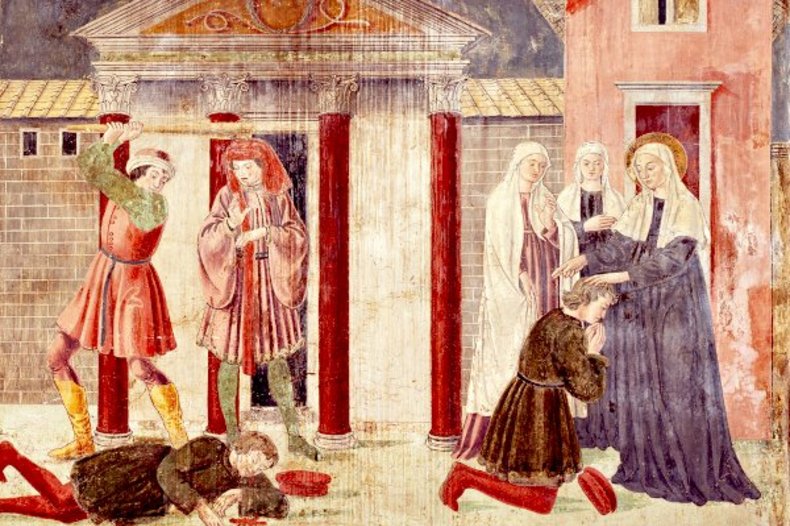
Antoniazzo Romano, Saint Françoise Romaine healing a dying man, 1468, Monastero di Tor de Specchi, Rome / © CC0, wikimedia.
Les raisons d'y croire :
- Gian Evangelista Ponziani's appearance to his mother was neither an illusion nor a dream she had when she dozed off during prayers. Francesca was perfectly awake and had a coherent conversation with her son, every detail of which was fixed in her memory.
Gian Evangelista announced to his mother another misfortune that could yet befall her: "Mother, the Lord is calling my little sister Agnese away from you; her place is ready in the heavenly Jerusalem. Don't be distressed, but rejoice in knowing that your children are among the angels of heaven." If she was looking for consolation for her grief by inventing dialogues with her dead son, this is not certainly not what Francesca would have invented. A year after this announcement, Agnese died of a childhood illness at the age of eight, confirming the apparition Francesca had received.
- Francesca was used to taking her son's words seriously, when he was still on earth. From his earliest childhood, Gian Evangelista had a prophetic charisma and was able to announce disasters. These prophecies came true, even the most improbable ones, such as the day when the very young boy warned a priest, a guest at their table, against immoderate ambition that would lead to his downfall in this world and the next. Having become a bishop, the priest indeed made very bad use of his position.
- The archangel, who accompanied her as a child and never left her side, was not an "imaginary friend" or the projection of a woman frustrated in her maternal love. Although Francesca was the only one to see him and talk to him, several other people (including Don Giovanni Mattiotti, her confessor) witnessed spectacular phenomena proving the presence near her of a being, who was certainly invisible, but who intervened in her daily life and interacted with her. Witnesses also reported the interventions of other invisible beings, easy to identify as demons, who constantly persecuted Francesca, as well as her sister-in-law and friend Vanozza, even going so far as to attempt murder.
- Don Mattiotti had her write down her ninety-three visions, and vouched for them when they were published before the ecclesiastical authorities. Wracked with anguish over the divisions in the Church and the misfortunes of the times, he testified that on several occasions he asked the Archangel, through Francesca, for advice and counsel, which she couldn't have invented, as she did not possess the necessary knowledge to give advice.
- We cannot assume that Francesca was lying or inventing her interactions with the angel, such was her intense piety and respect for God. In fact, our primary source about her life is the biography written by her confessor, who defended its perfect authenticity and the countless miracles recounted in it, before the Pope.
- It is impossible to believe that she was mentally deranged. No one was more balanced than Francesca, who, with her feet firmly on the ground, faced difficulties, problems and tragedies with unflagging courage and common sense. She was able to juggle all her responsibilities as wife, mother and head of the family - particularly during the difficult period of the absence of her husband, eldest son and brother-in-law - as well as the charitable work she was involved in, such as the religious community she had founded.
As she grew older, Francesca's charisms multiplied, proving the reality of her visions and her connections with the invisible world. She was stigmatised and transverberated - her heart was pierced, like Christ's - and she was able to distinguish between consecrated and non-consecrated hosts; she read souls and possessed the gifts of a miracle worker, so that when doctors saw her, they said that they "could do nothing where God is at work"; she obtained fruit out of season (pears in March and grapes in January) to prove her claims were true; she was credited with the resurrection of a stillborn baby and a little girl who had drowned in the River Tiber; she had constant visions and ecstasies; she visited hell and purgatory under the guidance of the archangel Raphael, and so on.
- All these phenomena, recorded by her confessor and which made her so popular during her lifetime, were included in her bull of canonisation on 29 May 1606 by Pope Paul V, proof that no one questioned them.
Synthèse :
Francesca Bussa was born in Rome in 1384 into an aristocratic family. From an early age, she was drawn to the cloister and the contemplative life - a future that did not suit her parents, who wanted to ally themselves with the powerful Ponziani family. On the advice of her confessor, who insisted on obedience, the twelve-year-old resolved to accept a marriage that was repugnant to her.
Although Lorenzo was a charming and pious young man, with whom she lived happily for forty years and had three children, having to give up her desire to give herself to Christ was such a misfortune for Francesca that she fell ill. Just when she was thought to be dying, St Alexis appeared to her and asked her, on behalf of God, whether she really wanted to die or whether she was willing to live and suffer,in order to show what a true Christian committed to marriage could do for Jesus and the good of souls. Francesca agreed to sacrifice herself and was instantly healed.
This heroic choice brought into her daily life an invisible world that she had only glimpsed before. Angels and demons never left her side. The devil, fearful of the good she would do, unable to seduce her with the attraction of material goods, furious at her fasts of dry bread, water and unsalted boiled vegetables, and even more so at her penances (cilice, an iron chain around her body), her discipline (she whipped herself to mortify her flesh and atone for the sins of lust of others) and her humility, which led her to dress like a woman of lower classes and to do menial tasks, tried to divert her from this devout life by every means possible. He took the appearance of a religious who painted a disgusting picture of piety and the people of the Church, trying to make her abandon prayers and the sacraments. One night, while her husband was away, Francesca was woken by the weight of a body on top of hers; frightened, she discovered that she was sharing her bed with a rotting male corpse, the stench of which lingered with her for a long time... The devil took to physical abuse, pushing Francesca down staircases or into lit fireplaces, hanging her above the void, threatening to drop her, and trying to drown her in the Tiber with her sister-in-law. He also attacked her sister-in-law, causing her to fall and sustain serious injuries, in order to drive Francesca to despair by depriving her of her best friend and confidante.
By the early 1410s, Francesca Ponziani was a tried and tested wife and mother. Her husband, Lorenzo, had been banished from Rome because he had sided with Pope Gregory XII in the never-ending dispute over the Great Western Schism, which was tearing Catholicism apart and now saw three pontiffs vying for the tiara. Her eldest son, Gian Battista, has been taken hostage to free his uncle, a prisoner of the King of Naples. Taking advantage of their absence, their rivals, the Colonna family, ransacked the Ponziani palace and seized all its assets, leaving Francesca, her two youngest children, Gian Evangelista and Agnese, and her sister-in-law Vanozza destitute. Then the plague swept through the city, taking the nine-year-old Gian Evangelista with it; Agnese joined her brother a little later. This accumulation of misfortunes only helped Francesca to grow in holiness.
When her dead son appeared and the archangel appointed to watch over her arrived, her child told her: "God has sent him to comfort you and guide you on your pilgrimage from earth to heaven. He will always be with you."Francesca experienced this. Although he belonged to a lower angelic choir, the second, the archangel emitted such brightness that she couldn't sustain it and he had to veil it when, on certain occasions, he allowed her to see him. She found this convenient, because in the evening she could read without a lamp! The interventions of the heavenly spirit were always remarkable. During a supper, Francesca was distracted and let her guests say bad things about someone; to punish her, the angel gave her a loud slap on the cheek that everyone heard, and which left the mark of five fingers on her face...
A few years later, when her daughter-in-law continually humiliated and abused her, bringing her to tears, the angel, exasperated by the young woman's ways, gave her the beating she deserved in the middle of a family meal. On another occasion, when the devil tried to snatch Francesca's three-year-old grandson from her arms, the Archangel intervened to put him back to sleep in his cot. All those present were stunned, even though they did not see the angel, to see the baby fly across the room, land in his bed and be tucked in by an invisible hand.
In 1425, Francesca founded a congregation called the Oblates of Saint Benedict, which later became the Oblates of Saint Frances of Rome, to which she retired in 1436 on the death of her husband, but refused to become superior, preferring to go begging for the poor or do the hardest jobs. Shortly afterwards, the archangel left her and gave way to a Power, an angel from a higher choir who was better able to accompany her on the path to perfection, and whose presence kept the demons at bay for good. A vision of Saint Benedict convinced her to accept the superiorate, the last sacrifice for the great lady whom Rome called "la poverella del Trastevere" ("the little pauper of Trastevere").
Having fallen ill at the beginning of March 1440 while nursing her son back to health, Francesca predicted that she would not live beyond the following Thursday. She died four days later, on 9 March, as she had said, surrounded by such veneration that she became the saint of Rome par excellence. Her last words were: "I see heaven open. The angel is standing before me; he is calling me! My task is complete."
Anne Bernet is a Church History specialist, postulator of a cause for beatification and journalist for a number of Catholic media. She has written over forty books, most of them devoted to sanctity.
Aller plus loin :
St. Frances of Rome: The Life, Miracles, and Mystical Encounters of a True Roman Saint by Rev Tobias Hartwell, Independently published (November 23, 2024)
En savoir plus :The Life Of Saint Frances Of Rome: Biography and visions of saint Frances of Rome by Cole M. Gabriel, Independently published (March 11, 2024)
- Paul V, Bull of canonisation of Saint Frances of Rome, 1608.
- The website of the Oblates of Saint Frances of Rome (in Italian).
The Life Of Saint Frances Of Rome: Biography and visions of saint Frances of Rome by Cole M. Gabriel, Independently published (March 11, 2024)











